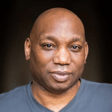
Episode 490: Seeing the Fish and the Tank with Jeff Chang
"When I got back to [writing], it was like an athlete or a martial artist coming back to the practice, and the endorphins start running back. And you remember the joy that you had in it, also the struggles of it, but you're back in it, and then I couldn't be stopped," says Jeff Chang, author of Water, Mirror, Echo.
Today we have Jeff Chang, and what a great conversation this was. He’s the author of the beefy biography Water, Mirror, Echo: Bruce Lee and the Making of Asian America. It’s published by Mariner Books, so we share a publisher here. Pretty cool.
He’s also the author of Can’t Stop, Won’t Stop: A History of the Hip-Hop Generation, which was the winner of the American Book Award, Who We Be: A Cultural History of Race in Post-Civil Rights America, and We Gon’ Be Alright: Notes on Race and Resegregation.
He’s a writer, host, and cultural organizer known for his work in culture, politics, the arts, and music. His work has appeared in the New York Times, Wall Street Journal, The Guardian, Los Angeles Times, and the Believer, among many others. He has a great Substack at zentronix.substack.com and you can follow him on Instagram @zentronix. You can learn more about Jeff at jeffchang.net.
We talk about:
- How hip-hop influenced his work
- Trust and relationships
- Voice
- Compression
- And stealing time to write
Why don't you settle in?
Newsletter: Rage Against the Algorithm
Show notes: brendanomeara.com



















